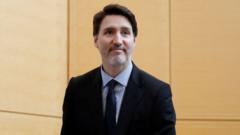In light of recent media speculation, Canadian Prime Minister Justin Trudeau is rumored to be contemplating his resignation as the leader of the governing Liberal Party. Reports indicate that a formal announcement could be made as early as the next few days, potentially before his party's caucus meeting on Wednesday. This move would conclude his nine-year term as Prime Minister. The situation within the party has become increasingly fraught, particularly following the resignation of his finance minister last month, who cited policy disagreements, particularly concerning trade tensions with the U.S.
Trudeau's popularity has been on a downward trajectory, as recent polls indicate that a substantial portion of the electorate disapproves of his leadership. A staggering two-thirds of voters have expressed dissatisfaction, with only 26% favoring him as their preferred prime minister. Additionally, the Liberal Party faces a significant challenge in the upcoming general election, needing to confront a strong Conservative opposition led by Pierre Poilievre, who is currently 19 points ahead in the polls.
Should Trudeau decide to step down, it is uncertain whether he would remain in office until a new leader is established or resign immediately. Moreover, the stakes are high, as the next Liberal leader will need to guide the party through a tumultuous election season while addressing troubling economic issues and potential trade conflicts with the United States, especially under the incoming leadership of Donald Trump, who has indicated he may impose tariffs on Canadian goods.
This potential shift marks a pivotal moment in Canadian politics, ending an era for Trudeau, who first ascended to power in 2015 on a platform of progressive change. Despite an ambitious agenda focused on issues like immigration and climate change, his tenure has been marred by scandals and declining public trust. As internal pressures mount with calls for his resignation from more than a dozen MPs, the future direction of the Liberal Party hangs in the balance, reflecting broader dissatisfaction and the growing complexity of governance in Canada.
Trudeau's popularity has been on a downward trajectory, as recent polls indicate that a substantial portion of the electorate disapproves of his leadership. A staggering two-thirds of voters have expressed dissatisfaction, with only 26% favoring him as their preferred prime minister. Additionally, the Liberal Party faces a significant challenge in the upcoming general election, needing to confront a strong Conservative opposition led by Pierre Poilievre, who is currently 19 points ahead in the polls.
Should Trudeau decide to step down, it is uncertain whether he would remain in office until a new leader is established or resign immediately. Moreover, the stakes are high, as the next Liberal leader will need to guide the party through a tumultuous election season while addressing troubling economic issues and potential trade conflicts with the United States, especially under the incoming leadership of Donald Trump, who has indicated he may impose tariffs on Canadian goods.
This potential shift marks a pivotal moment in Canadian politics, ending an era for Trudeau, who first ascended to power in 2015 on a platform of progressive change. Despite an ambitious agenda focused on issues like immigration and climate change, his tenure has been marred by scandals and declining public trust. As internal pressures mount with calls for his resignation from more than a dozen MPs, the future direction of the Liberal Party hangs in the balance, reflecting broader dissatisfaction and the growing complexity of governance in Canada.



















